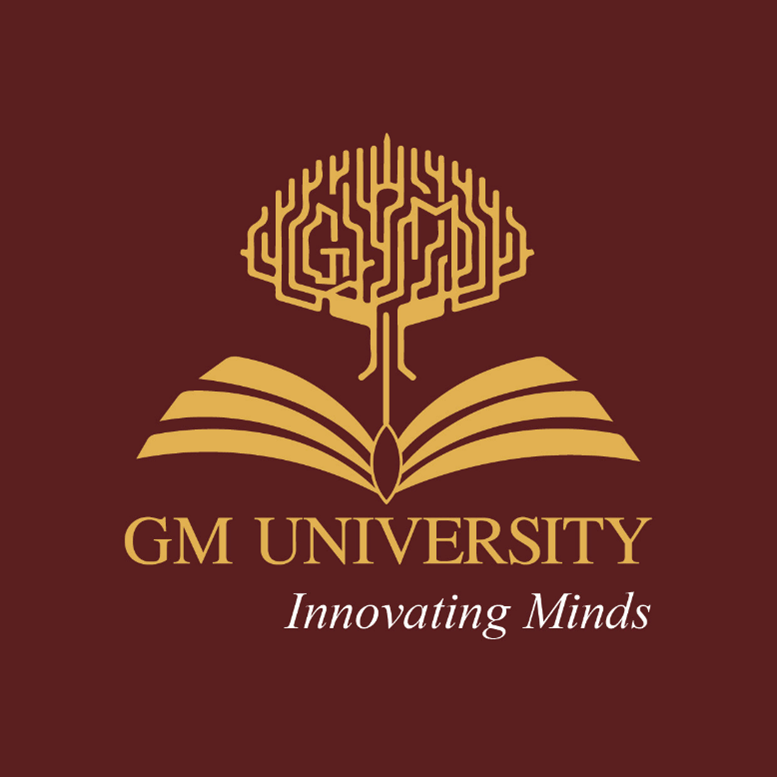- About Us
- Introduction
- Srishyla Educational Trust
- G M University
- GMU- Campus
- GMU Logo, Flag and Mascot
- GMU- Anthem
- Vision, Mission, Values, and Objectives
- Leadership
- Statutory Committees
- University Documents
- Organisation Structure
- University Best Practices
- Information and Communication Technology (ICT)
- Learning Management System (LMS)
- Human Resources (HR)
- Collaboration and Cooperation
- Programs
- Admissions
- Academics
- Research
- Introduction
- Research Advisor Message
- Dean's Message
- PhD Programs offered &
PhD Regulations - Notifications &
Circulars - Galary
- Curriculum
- PhD Admissions
- PhD Supervisors
- PhD Research Scholar List
- Journal Publications
- Conference Publications
- Conferences/Symposium Organized
- Patents
- Research Bulletin
- Sponsored/Grant Research
- Prestigious Lecture Series
- Centres of Excellence
- Skill Development
- Home About Us
- Introduction
- Srishyla Educational Trust
- G M University
- GMU- Campus
- GMU Logo, Flag and Mascot
- GMU- Anthem
- Vision, Mission, Values, and Objectives
- Leadership
- Statutory Committees
- University Documents
- Organisation Structure
- University Best Practices
- Information and Communication Technology (ICT)
- Learning Management System (LMS)
- Human Resources (HR)
- Collaboration and Cooperation
- Programs
- Admissions
- Academics
- Campus life
- Promotions
- Student Placements
- Contact Us
- Careers
Key Features of IDEA Lab
The IDEA Lab at GM University is an innovative space designed to inspire creativity, promote collaboration, and drive the development of ground-breaking ideas. It serves as a dynamic hub where students, faculty, and industry experts can come together to brainstorm, experiment, and bring novel concepts to life. With a focus on fostering an environment conducive to creative exploration, the IDEA Lab equips participants with the tools and guidance needed to transform ideas into tangible solutions[1].
Key Features of the IDEA LAB:
Innovation and Design Thinking (Product Idea Generation and Design Thinking)
At GMU, workshops on Product Idea Generation and Design Thinking are organized for students, usually in their 4th semester. These sessions are led by experienced experts who guide students through creative problem-solving methods. Students are grouped into teams to brainstorm innovative ideas that address real-world needs. The best ideas are shortlisted for further development into functional product prototypes. This process helps students build creativity, teamwork, and practical thinking. Faculty benefit by mentoring young innovators and aligning academic learning with industry needs. Overall, the workshops create a strong foundation for entrepreneurship, research, and skill-based education in the university[1].
Product Incubation and Design (Functional Product Prototype Development and Evaluation)
At GMU, shortlisted product ideas are taken forward for Functional Product Prototype Development and Evaluation. Students work in teams to build working prototypes of their ideas using tools and facilities available at the IDEA Lab. They receive expert guidance throughout the design and development process. Once the prototypes are ready, they are demonstrated and evaluated for functionality, innovation, and usability. This hands-on experience helps students apply theoretical knowledge to real-world problems, enhancing their technical and creative skills. Faculty members play a key role in mentoring and evaluating projects, fostering a culture of innovation and research within the university[1].
Business Incubation and Start-ups (Setting-Up Start-ups)
At GMU, once a functional prototype is shortlisted, students are encouraged to transform it into a commercially viable product by adding necessary features. They are guided to form their own start-ups to develop and launch the product. The university provides full support, including workspace, tools, expert advice, and financial assistance if needed. An agreement is signed for profit sharing if the start-up grows into a successful business. This approach helps students become real-world entrepreneurs while still in college. Faculty benefit by mentoring future innovators and participating in impactful, outcome-based education that connects academics with real business opportunities[1].
Entrepreneurship Development
At GMU, students who are ready to produce and market their product are supported through Entrepreneurship Development. If space is available in the university's Innovation Park, it is offered to set up and run a full-fledged enterprise. If not, students are guided to establish their start-up outside the campus. In cases where the university sees potential for mutual growth, it may choose to become a partner through a separate agreement. Otherwise, students are free to go independent. This support helps students become job creators, while faculty gain opportunities to engage in industry partnerships, research, and real-world innovation activities[1].
Technical Consultancy
GMU's Technical Consultancy Cell offers specialized support for entrepreneurs and innovators in product design, development, and testing. The cell is equipped with trained experts who provide end-to-end technical services including 3D modelling, engineering analysis, prototype fabrication, 3D printing, and product testing. These services help entrepreneurs turn their ideas into functional, tested products with professional guidance. The consultancy cell acts as a valuable resource for students, faculty, and external startups, promoting industry-academia collaboration. Detailed information about available services, procedures, and support can be found in our Technical Consultancy Brochure, accessible through the university's innovation and entrepreneurship development office[1].
